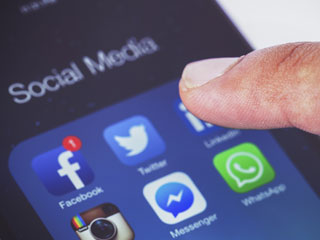Are You Addicted to Social Media?

By: RAFEENA BACCHUS, M.D.
People are social by nature. We need the company of others, and the strength of our relationships affect our mental and physical health.
Today, many of us use social media platforms such as Facebook, Twitter, TikTok, YouTube and Instagram to connect with each other. Kids, teens, and young adults are the heaviest social media users, but most adults are also active on at least one platform.
For most of us, social media is an enjoyable way to pass time and connect with family and friends. However, some people say social media has a negative impact on their lives, but they continue to use it anyway. Their behavior seems to be out of control, causing some health professionals to say they are addicted to social media.
How social media addiction works
The process of using social media – posting and reacting to content — causes your brain to release the pleasure chemical dopamine. The more you use social media and receive the rewarding dopamine, the more your brain will want it. Over time, your brain can become dependent/addicted to the good feeling social media gives you.
Social media platforms like Facebook, TikTok, Twitter and YouTube also track your activity and customize your feed to show you posts you want to view and comment on. This makes social media more addictive in nature.
One of the signs of addiction is continuing to use something even after it has clearly had a negative impact on you. If social media use is interfering with your relationships, self-esteem, work or school, but you can’t stop using it, that is a possible sign of addiction.
Signs you may have a social media addiction
If you have several of the behaviors below, it may be a sign that your social media use is getting out of hand.
- You log in very often, wasting time with unproductive browsing. You check social media first thing in the morning and repeatedly through the day.
- You constantly check your notifications and update your status.
- You use social media to escape from the real world. If stress and discomfort in your life are getting to you, you seek refuge in the virtual community.
- If you can’t get on social media, you get agitated. You become anxious over time spent away from your device or without an internet connection.
- You plan your social media posts in advance. You go places just to take selfies there, and get distracted during daily activities by thinking about how you plan to describe them later on social media.
- You get upset when your posts online aren’t appreciated.
- Social media gets in the way of your real-life connections. You make choices that cut out friends and family and replace them with avatars and status updates.
Health risks of social media addiction
People who habitually and excessively use social media can suffer mental and physical effects.
- You may unfavorably compare yourself to people online, causing you low self-esteem.
- Seeing others have a good time may contribute to a greater sense of loneliness, isolation, and the fear of being left out.
- Exposure to misinformation, especially false health news, can keep you from getting the medical care you need or persuade you to try unsafe products and treatments.
- Dealing with negative people, trolls and bullies can make you anxious and depressed.
- Checking your feed late at night/during the night can disrupt your sleep patterns, affecting your performance at work or school.
- Hours of screen time means less physical activity, which may lower your overall health.
- Being obsessed with online people can make you ignore the important relationships in your life.
- Motivated by the desire for online approval, you may engage in risky behavior, such as playing dangerous pranks or posting embarrassing material. And if you glance at your news feed while driving, you are up to four times more likely to be involved in a crash.
How to cut back on social media
If you think social media is becoming a problem, you may need to cut back to reach a healthy level of use. Try the helpful tips below, but if you still struggle, consult with your healthcare provider for additional resources.
- Turn off notifications from social media apps. They are a major source of distraction and temptation.
- Change the desktop color settings of your phone to black and white to make them less attractive.
- Silence your phone during work, as well as during school, meals, and recreational activities.
- Delete social media apps from your phone to decrease the amount of time spent on them. (You can still use them on your computer at home.)
- Set aside a certain amount of time for social media each day. Don’t go beyond it.
- Turn on a timer to help keep you accountable for how much time you spend online.
- Leave your phone, tablet, and computer out of your bedroom.
- See your friends and family in person more often.
- Take up a new hobby that’s not technology-related like sports, art, or classes.
 Dr. Rafeena Bacchus sees patients at MPCP’s Columbia office. She received her medical degree from SUNY at the Buffalo School of Medicine and completed her residency program in Internal Medicine at the University of Maryland. She is certified by the American Board of Internal Medicine.
Dr. Rafeena Bacchus sees patients at MPCP’s Columbia office. She received her medical degree from SUNY at the Buffalo School of Medicine and completed her residency program in Internal Medicine at the University of Maryland. She is certified by the American Board of Internal Medicine.





